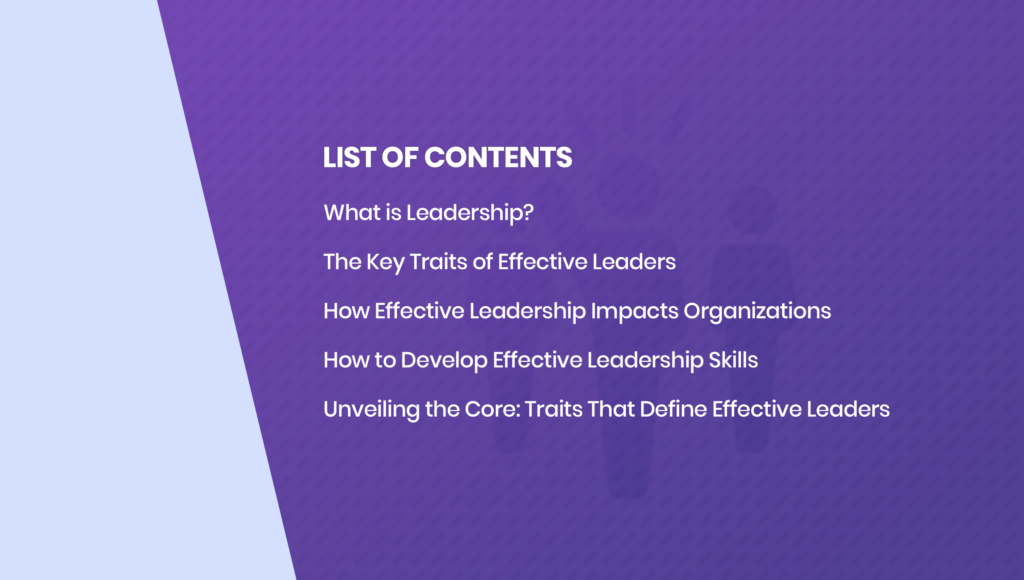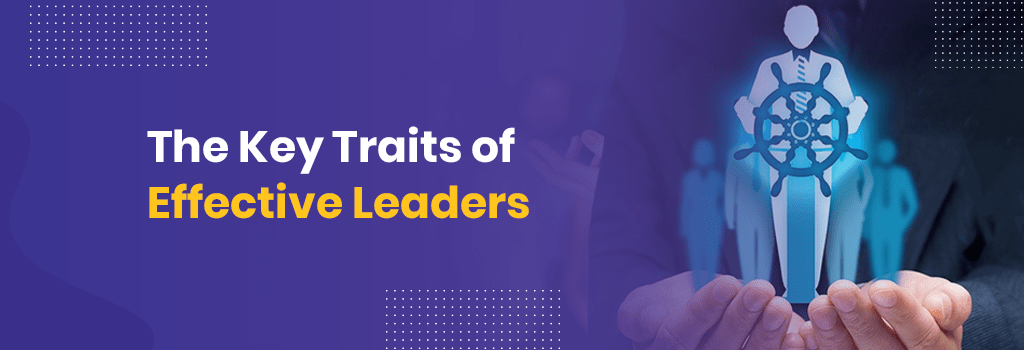What makes effective leaders? A blend of vision, empathy, and resilience – the cornerstone traits of impactful leadership.

Leadership is a crucial aspect of any organization, whether it’s a small business or a multinational corporation. Effective leaders are essential for driving growth, inspiring employees, and achieving success.
But what makes a leader truly effective? In this article, we’ll explore the key traits of effective leaders and how they can impact the success of an organization.
What is Leadership?
Before we dive into the traits of effective leaders, let’s define what leadership is. Leadership is the ability to guide, motivate, and influence a group of individuals towards a common goal. It involves making decisions, setting direction, and inspiring others to follow.
Leadership can take many forms, from leading a team in a corporate setting to leading a community organization or even leading a family. Regardless of the context, effective leadership is crucial for achieving success.

The Key Traits of Effective Leaders
Visionary Leadership
Effective leaders have a clear vision and purpose for their organization. They know where they want to go and have a plan for how to get there. This vision and purpose serve as a guiding light for the organization and inspire others to work towards a common goal.
Having a clear vision and purpose also helps leaders make decisions and prioritize tasks. It allows them to focus on what is most important and avoid getting sidetracked by distractions.
The Power of Communication
Effective leaders are also excellent communicators. They can clearly articulate their vision and purpose to others and inspire them to take action. They are also skilled at listening and understanding the needs and concerns of their team members.
Communication is a two-way street, and effective leaders know how to foster open and honest communication within their organization. This helps build trust and creates a positive work environment where everyone feels heard and valued.
Agility in Action
In today’s fast-paced world, things are constantly changing, and effective leaders know how to adapt and be flexible. They are open to new ideas and are willing to pivot when necessary to achieve their goals.
Adaptability and flexibility also allow leaders to navigate challenges and setbacks without getting discouraged. They can quickly come up with alternative solutions and keep their team moving forward.
The Heart of Leadership
Emotional intelligence is the ability to understand and manage one’s emotions and the emotions of others. Effective leaders have high emotional intelligence, which allows them to build strong relationships with their team members and understand their needs and motivations.

Leaders with high emotional intelligence are also able to regulate their emotions and remain calm and composed in stressful situations. This helps them make rational decisions and avoid conflicts.
Compassionate Leadership
Empathy is closely related to emotional intelligence and is another crucial trait of effective leaders. Empathy is the ability to understand and share the feelings of others. Leaders who are empathetic are better able to connect with their team members and build trust.
Empathetic leaders also take the time to understand the perspectives and needs of their team members. This allows them to make decisions that benefit the entire team and create a positive work environment.
Decisive Moves
Effective leaders are decisive and can make tough decisions when necessary. They weigh the pros and cons, gather all the necessary information, and make a decision without hesitation. When leaders are decisive, it shows that they are confident in their abilities and can be trusted to make the right decisions.
Decisiveness also inspires confidence in team members and is especially important in times of crisis when quick decisions need to be made.
Ownership and Responsibility
Effective leaders take responsibility for their actions and hold themselves accountable for their decisions. They also hold their team members accountable for their actions and ensure that everyone is working towards the same goals.
Accountability creates a sense of ownership and responsibility within the organization. When leaders hold themselves and others accountable, it fosters a culture of trust and reliability.
Keys to Growth
Effective leaders are always looking for ways to improve and grow. They are open to feedback and are constantly seeking new knowledge and skills. This allows them to stay ahead of the curve and adapt to changing circumstances.
Continuous learning also sets a good example for team members. When leaders prioritize learning and development, it encourages their team members to do the same.
How Effective Leadership Impacts Organizations
Effective leadership has a significant impact on the success of an organization. Here are some ways that effective leadership can benefit an organization:
Enhances Organizational Performance
Effective leaders can motivate and inspire their team members, leading to increased productivity and efficiency. When team members are engaged and motivated, they are more likely to work harder and produce better results.

Effective leaders also prioritize efficiency and are always looking for ways to streamline processes and improve workflows. This helps the organization run more smoothly and achieve its goals more efficiently.
Strengthens Employee Commitment
Effective leaders create a positive work environment where employees feel valued and motivated. This leads to higher levels of employee engagement and satisfaction, which can help with employee retention.
When employees feel connected to their leaders and the organization, they are more likely to stay with the company long-term. This reduces turnover and saves the organization time and resources on recruiting and training new employees.
Empowers Sound Decision-Making
Effective leaders are skilled at making decisions and can do so quickly and confidently. This allows the organization to move forward and make progress without getting hindered by hesitation.
Effective leaders also involve their team members in the decision-making process, which can lead to better decisions. When team members feel heard and valued, they are more likely to contribute their ideas and expertise, leading to better outcomes.
How to Develop Effective Leadership Skills
Effective leadership is not something that comes naturally to everyone, but it can be developed and improved over time. Here are some ways to develop effective leadership skills:
Explore Leadership Symposiums and Seminars
Attending leadership conferences and workshops is a great way to learn from experienced leaders and gain new insights and skills. The Global Leadership Summit is an excellent opportunity for leaders to learn from top experts and network with other leaders from around the world.
Embrace Guidance and Mentorship
Seeking feedback from team members and mentors is a great way to identify areas for improvement and develop effective leadership skills. Mentors can also provide valuable guidance and support as you work on developing your leadership skills.
Dive into Leadership Literature and Resources
There are many books and articles available on leadership that can provide valuable insights and tips for developing effective leadership skills. Some recommended reads include “The 7 Habits of Highly Effective People” by Stephen Covey and “Dare to Lead” by Brené Brown.
Unveiling the Core: Traits That Define Effective Leaders
Effective leaders possess a multifaceted array of attributes that set them apart. From visionary thinking to adept communication skills, adaptability, and a deep sense of empathy, these qualities form the bedrock of their leadership ethos not only drives organizational growth but also enhances employee engagement, instilling higher levels of trust and overall well-being within the workplace.

